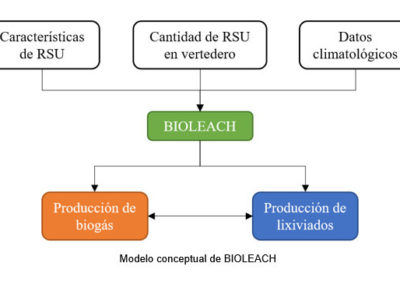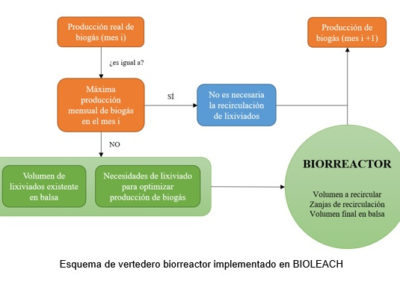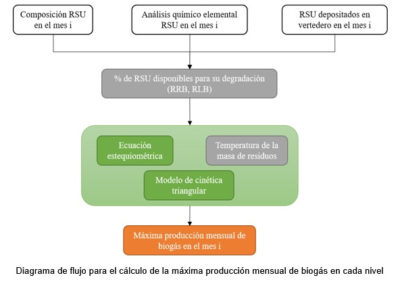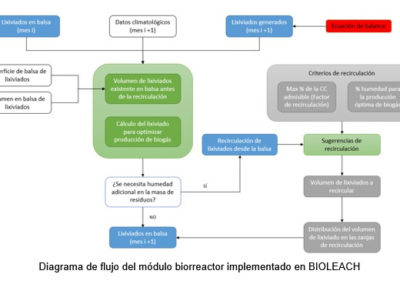BIOLEACH
Mathematical model for the joint evaluation of leachate and biogas production in municipal solid waste landfills
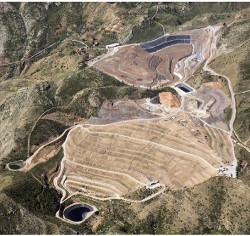
Description
Characteristics
Images
Additional Information
Download
Description
BIOLEACH is a new mathematical decision support model for the real-time management of municipal solid waste landfills. The model evaluates joint estimations of leachate and biogas production and incorporates the possibility of simulating the recirculation of leachate, both on the landfill surface and inside the waste mass and is, therefore, also suitable for simulating the bioreactor landfill behavior.
Characteristics
BIOLEACH model has been conceived from its origin to be a support tool for landfill management that can be used by the operator himself. Conceptually, the model is based on a particular formulation of the water balance equation, as a fundamental tool for calculating leachate production. Through this formulation, the model avoids using parameters that can be complex to obtain.
BIOLEACH uses waste production data on a monthly scale, which gives it enough flexibility to adapt to possible variations derived from the real management needs of waste treatment facilities. Likewise, the model uses values of the climatological parameters on a monthly scale obtained from local stations, so that the simulations carried out incorporate the greatest possible amount of information. BIOLEACH is a landfill management tool that also allows justifying the qualities of the leachate recirculation volumes that ensure optimal humidity conditions inside the landfill, guaranteeing maximum biogas production.
The model serves as support for decision-making in the daily management of the landfill, responding to the real needs that the operator must face, considering that it receives a known amount of waste previously characterized under certain seasonal conditions and that the volume of leachate storage in the pond is limited.
BIOLEACH results show the economic benefits and environmental effects derived from the recirculation of leachate under management strategies such as bioreactor landfill. In a similar way, the model performs economic calculations that allow the reduction of costs associated with the external management of leachate to be evaluated.
Images
Additional Information
The production, management and disposal of solid waste are some of the environmental aspects of greatest interest that are associated with all our cities, industrial areas and agricultural activities. Regardless of the existence of other non-hazardous waste treatment and disposal techniques, in Spain the most common is for these systems to be made up of mechanical-biological treatment plants with landfillls for the final disposal of plant rejects. The landfill is therefore considered as an absolutely necessary facility without which the municipal solid waste (MSW) management system cannot be conceived. Being necessary, the landfill is, however, one of the most important sources of environmental pollution, and can compromise the balance of ecosystems and human health if its management is not carried out under conditions that guarantee that the emissions of pollutants to the environment are carried out in an appropriate and controlled manner.
Emissions of polluting substances produced by MSW landfills can refer both to emissions of substances in the gaseous phase (biogas) and in the liquid phase (leachate). Inadequate management of biogas and landfill leachate can have serious negative effects on atmospheric air quality and on soil and groundwater quality. MSW landfills are one of the main sources of greenhouse gas emissions and can also cause strong odor nuisance to exposed people. On the other hand, leachate can seriously affect the quality of the soil and groundwater if it is not properly confined inside the dumping vessel or in the storage pond, since it is a wastewater concentrate that has chemical parameters high toxicity. For all these reasons, it is essential to have analysis and modeling tools that allow adequately describing the behavior of MSW landfills, quantifying the volumes of leachate and biogas produced based on actual operating conditions. Unfortunately, to date, numerical modeling tools for the behavior of landfills under real operating conditions are very scarce.
The use of the BIOLEACH model as a decision support tool in real landfills allows the following results to be obtained:
- Reduce the environmental risks associated with the operations of depositing waste in controlled landfills: soil and groundwater contamination and greenhouse gas emissions.
- Minimize the volumes of leachate to be managed in external treatment facilities.
- Minimize the time needed to degas the landfill.
- Lower operating costs.
BIOLEACH model allows evaluating the joint production of leachate and biogas as coupled processes in MSW landfills. BIOLEACH is a landfill management model, conceived to be used by operators during daily exploitation tasks and allows the volumes of leachate and biogas produced on a monthly scale to be evaluated.
In view of the volumes actually stored in the pond and the real moisture conditions in the waste, the model provides the operator with suitable leachate recirculation suggestions to ensure that biogas production is maximum at all times, taking into account the particular weather conditions of the site.
It has been verified that the model can also be used to simulate the behavior of the landfill in the long term under different simulation scenarios that contemplate different landfill management strategies.
The model can also be used in the project phase to:
- Study what is the appropriate way to manage the landfill in view of the weather conditions and the characteristics of the waste.
- Define the most appropriate volume of the leachate pond in view of all the information.
BIOLEACH applications
BIOLEACH model has been used twice to date to simulate the behavior of real landfills. In 2019, at the request of TRAGSATEC, the operation of the Lorca landfill (Murcia) was analyzed. This practical application was used to verify the operation of the model.
The second practical application of BIOLEACH was carried out in 2020 at the request of the Ministry of the Environment of the Region of Murcia. On this occasion, the BIOLEACH model was chosen to simulate the behavior of four landfills located in the Region of Murcia (Cañada Hermosa, Cehegín, Fuente Álamo and Cartagena). These works have made it possible to update the forecasts included in the urban solid waste management planning for the region.
The development of the two previous projects has demonstrated the applicability of the BIOLEACH model to real cases and has made it possible to obtain relevant information to optimize landfill management techniques. The results of the analyses carried out on the five landfills in the Region of Murcia have made it possible to demonstrate that the use of the BIOLEACH model as a decision support tool optimally uses the volumes of leachate stored in the ponds and maximizes the volume of biogas produced. through the surface recirculation of the leachate with the consequent economic savings due to the reduction of leachate management costs in external wastewater treatment facilities.
Intellectual property (copyright)
Rodrigo-Ilarri, J.; Rodrigo-Clavero, M.E. BIOLEACH: Modelo matemático para la evaluación conjunta de la producción de lixiviados y biogás en vertederos de RSU. Código de referencia ND-307-2019, Universitat Politècnica de València, 2019.
International journals papers
- Rodrigo-Ilarri, J.; Rodrigo-Clavero, M.E; Cassiraga, E. BIOLEACH: A New Decision Support Model for the Real-Time Management of Municipal Solid Waste Bioreactor Landfills. Int. J. Environ. Res. Public Health, vol. 17, nº 5, p. 1675, 2020. https://doi.org/10.3390/ijerph17051675
- Rodrigo-Ilarri, J.; Rodrigo-Clavero, M.E. Mathematical Modeling of the Biogas Production in MSW Landfills. Impact of the Implementation of Organic Matter and Food Waste Selective Collection Systems. Atmosphere, vol 11, nº 12, p. 1306. 2020. https://doi.org/10.3390/atmos11121306
Book chapters
- Rodrigo-Ilarri, J.; Rodrigo-Clavero, M.E. Optimal Management of Municipal Solid Waste Landfill Leachate Using Mathematical Modeling: A Case Study on Valencia Region (Spain). En Handbook of Solid Waste Management. Sustainability through Circular Economy. Ed. Chinnappan Baskar. Springer Nature, 2021.
International conferences communications
- Rodrigo-Ilarri, J; Rodrigo-Clavero, M.E. BIOLEACH: a new mathematical model for the joint evaluation of leachate and biogas production in bioreactor municipal solid waste landfills. 29th International Solid Waste Association (ISWA) World Congress, Bilbao, pp. 252-253, 2019.
- Rodrigo-Clavero, M.E.; Rodrigo-Ilarri, J.; Hernández-Cruz, G. B. Mathematical modeling of the joint production of leachate and biogas from municipal waste landfills. Application to the Tlalnepantla landfill (Mexico). European Geosciences Union (EGU) General Assembly 2019, Viena, 2019.
- Rodrigo-Clavero, M.E.; Rodrigo-Ilarri, J. Urban solid waste landfills as a soil contamination source: effect of the solid waste composition on the evaluation of the leachate production. European Geosciences Union (EGU) General Assembly 2018, Viena, 2018.
- Rodrigo-Clavero, M.E.; Rodrigo-Ilarri, J. Impact of climate change on the leachate production of a bioreactor landfill. Congress on Groundwater and Global Change in the Western Mediterranean, Granada, pp. 219-225, 2017.
- Rodrigo-Clavero, M.E.; Rodrigo-Ilarri, J. BIOLEACH: a mathematical model for the joint evaluation of leachate and biogas production in urban solid waste landfills. European Geosciences Union (EGU) General Assembly 2017, Viena, 2017.
- Rodrigo-Ilarri, J.; Rodrigo-Clavero, M.E. Modeling leachate production in urban solid waste landfills using a simple water balance scheme. 41st International Association of Hydrogeologists (IAH) International Congress “Groundwater: Challenges and Strategies”, Marrakesh, pp. 2117, 2014.
- Rodrigo-Ilarri, J.; Rodrigo-Clavero, M.E. Desarrollo y aplicación de modelos de evaluación de la producción de lixiviados en vertederos de residuos sólidos urbanos. II Congreso Ibérico de las Aguas Subterráneas (CIAS 2014), Valencia, pp. 781-792, 2014.
- Rodrigo-Ilarri, J.; Rodrigo-Clavero, M.E. Sensitivity analysis of the waste composition and water content parameters on the biogas production models on solid waste landfills. European Geosciences Union (EGU) General Assembly 2014, Viena, 2014.
Download
If you are interested in learning more about the software and obtaining a Beta version, contact with Javier Rodrigo Ilarri: jrodrigo@upv.es


